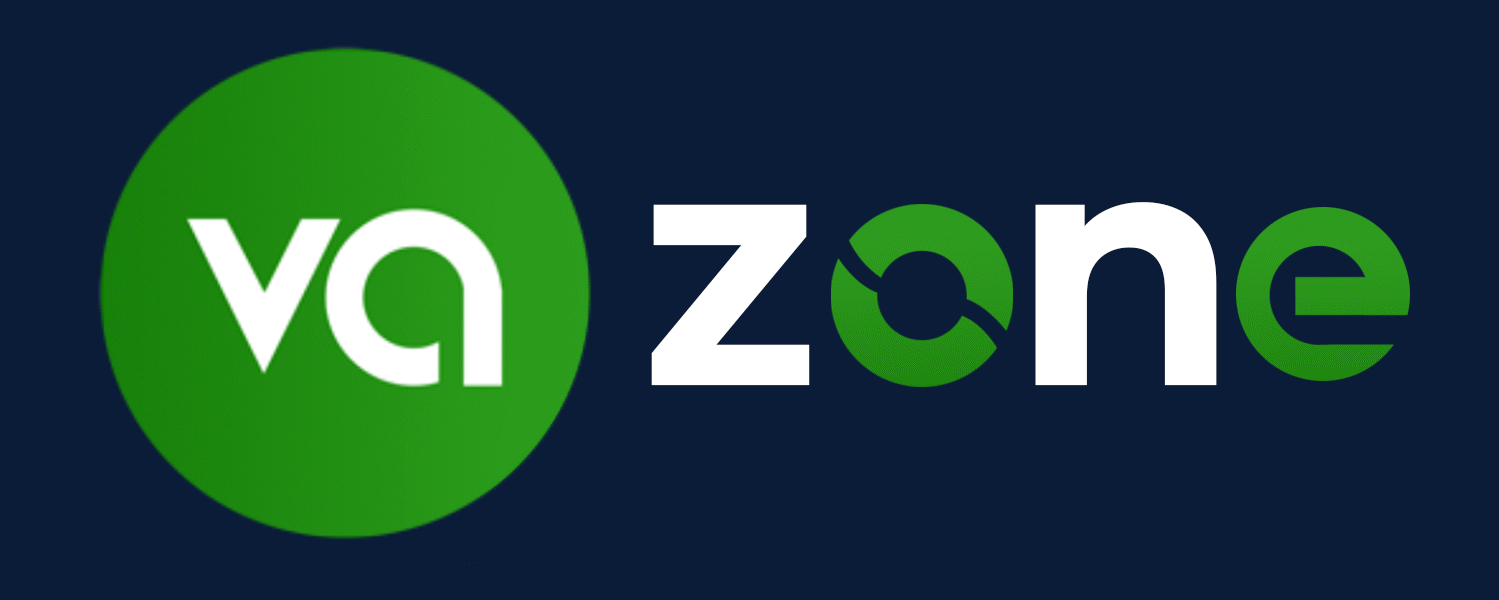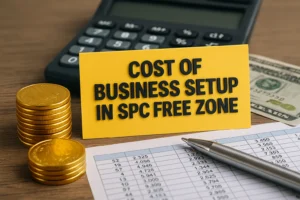
VAZONE Expert Guide
Overview of Dubai as a Leading Business Hub
Dubai is a global city known for its creation, economic diversification, and strategic location at the crossroads of Europe, Asia, and Africa. It serves as a gateway to the Middle East, North Africa, and South Asia, offering unparalleled access to emerging markets. The city’s world-class infrastructure, including state-of-the-art ports, airports, and telecommunications, further improves its appeal as a business destination. Additionally, Dubai’s tax-free environment, political stability, and investor-friendly policies have made it an attraction for foreign investment.

Table of Contents
What is the difference between the Dubai Free Zone and Dubai Mainland Company?
Every country tries to find the best ways to grow its economy. The UAE government has also worked hard to create a business-friendly environment. To entice foreign investors and entrepreneurs, the UAE introduced special areas called Free Zones. Now, when someone wants to start a business in Dubai, they face a big question: Should they set up in a free zone or on the mainland?
This article explains the differences between free zones and mainland business setups in simple words. By the end, you’ll understand which option is better for your business goals.
What is a Mainland Company in Dubai?

A Mainland company is a business that is registered with the Department of Economic Development (DED). It can operate anywhere in Dubai and the UAE. Mainland companies are great for businesses that want to work directly with local customers, participate in government projects, or bid for contracts.
However, in most cases, a local Emirati partner is needed to own at least 51% of the business. However, for some professional or service-based businesses, 100% foreign ownership is allowed. Mainland companies must follow UAE tax laws and have a physical office.
What is a Free Zone Company in Dubai?

A Free Zone company is a business registered in one of Dubai’s special economic zones. These zones are designed to attract foreign investors by offering benefits like 100% foreign ownership, tax exemptions, and customs duty benefits. Each Free Zone focuses on specific industries, such as technology, media, or logistics.
Free Zone companies are perfect for businesses that want to focus on international trade. However, they cannot do business directly on the UAE mainland without a local distributor.
Difference Between Dubai Free Zone and Dubai Mainland

1. Ownership Structure: Foreign Ownership and Local Sponsorship
- Free Zone: 100% foreign ownership is allowed. This means you don’t need a local partner to start your business.
- Mainland: A local partner is usually required to own 51% of the business. However, some activities now allow 100% foreign ownership.
2. Scope of Business Operations: Local vs. International Trade
- Free Zone: Businesses can only operate within the Free Zone or trade internationally. To work in the UAE mainland, they need a local distributor.
- Mainland: Companies can barter anywhere in the UAE and globally. They can also participate in government projects.
3. Regulatory Authorities: Governing Bodies and Compliance Requirements
- Free Zone: Each Free Zone has the authority to manage licenses and rules.
- Mainland: The Department of Economic Development (DED) oversees all Mainland businesses.
4. Office Space Requirements: Physical Presence and Flexibility
- Free Zone: Office space is optional in some Free Zones. You can choose virtual offices or shared workspaces to save costs.
- Mainland: A physical office is required, which can increase setup costs.
5. Visa and Staffing Provisions: Employee Sponsorship and Limits
- Free Zone: The number of visas depends on the office size. Some Free Zones offer visa packages.
- Mainland: There are no visa restrictions. You can sponsor as many employees as your office space allows.
6. Taxation Policies: Corporate and Personal Tax Implications
- Free Zone: Most Free Zones offer tax exemptions, but businesses must follow VAT rules.
- Mainland: Mainland companies are subject to UAE corporate tax (9% on profits above AED 375,000) and VAT.
7. Capital Repatriation: Profit Transfer and Financial Flexibility
- Free Zone: 100% of profits and capital can be sent back to your home country.
- Mainland: Profit transfer is allowed but must follow UAE banking rules.
8. Licensing Procedures: Application Processes and Costs
- Free Zone: The setup process is quick and simple, with fewer approvals needed.
- Mainland: More approvals are required, making the process longer.
Also, read Difference Between Mainland and Free Zone Licenses
9. Audit and Reporting Obligations: Financial Transparency Requirements
- Free Zone: Some free zones require annual audits, while others don’t.
- Mainland: Annual audits and financial reports are mandatory.
10. Business Setup Costs: Initial Investment and Operational Expenses
- Free Zone: Costs are lower, making it ideal for startups.
- Mainland: Setup costs are higher, but the benefits of accessing the local market are worth it.
How to Choose the Right Jurisdiction for Your Business
Choosing between a Free Zone and a Mainland setup depends on your business goals. Here’s a simple guide:
- Business Objectives:
- Free Zone: Best for international trade.
- Mainland: Best for local market access.
- Ownership Preferences:
- Free Zone: 100% foreign ownership.
- Mainland: A local partner may be required.
- Market Access:
- Free Zone: Limited to Free Zone and international markets.
- Mainland: Access to the entire UAE market.
- Budget:
- Free Zone: Lower costs for startups.
- Mainland: Higher costs but more opportunities.
Benefits of Setting Up in Dubai Free Zones
Tax Incentives and Exemptions
One of the biggest benefits of starting a business in a Dubai Free Zone is the tax savings. In Free Zones, businesses are given 100% exemption from corporate tax and import/export duties. This means companies can save a lot of money, especially if they deal with importing or exporting goods. For example, if a business imports raw materials or exports finished products, it won’t have to pay heavy taxes. This makes Free Zones a great choice for saving costs.
Additionally, these tax benefits are designed to attract foreign investors. As a result, many international companies choose to set up their businesses in free zones.
Simplified Import/Export Processes
Free zones are built to make international trade easier. They offer simple and fast procedures for importing and exporting goods. This means less paperwork, quicker customs clearance, and fewer delays. For businesses that rely on global trade, this is a big advantage.
For instance, if a company ships products to countries in Europe or Asia, it can benefit from the efficient logistics and customs services available in free zones like Jebel Ali Free Zone (JAFZA). This helps companies save time and focus on developing their processes.
Benefits of Selecting a Mainland Company
Access to Local Market
One of the main advantages of a Mainland company is the ability to access the UAE local market. Unlike Freezone companies, Mainland businesses can work directly with local customers and government entities and even participate in government projects. This opens up many opportunities to grow your business within the UAE.
For example, a construction company can bid for government contracts, while a retail business can sell directly to UAE residents. This makes the Mainland a great choice for businesses that want to tap into the local economy.
Flexibility in Business Activities
Mainland companies enjoy more flexibility in the types of business activities they can do. Unlike Free Zones, which often limit businesses to specific industries, Mainland companies can operate in a wide range of sectors. Whether you’re in trading, services, manufacturing, or retail, a Mainland setup allows you to explore different opportunities.
This flexibility is mainly helpful for businesses that want to diversify their operations. For instance, a company can start with trading and later expand into services without needing to change its setup.
Potential for a Larger Client Base
Operating on the Mainland means you can reach a wider customer base. You’re not limited to just international clients or businesses within a free zone. Instead, you can serve local customers, other Mainland businesses, and even government entities. This makes it easier to grow your business and increase revenue.
For example, a marketing agency in the Mainland can work with both local startups and large corporations. This gives it a competitive advantage and helps it attract more customers.
Which One is Right for You?
The choice between Free Zone and Mainland companies depends on your business goals, target market, and budget. A Free Zone might be ideal if you’re looking for 100% ownership and tax benefits. However, a Mainland company could be the better option if you want to tap into the broader UAE market.
Get Expert Guidance Today!
Still unsure which option suits your business needs? Let the VA Zone Business Setup Consultants experts guide you through the process. With years of experience in company formation, they’ll help you make the best decision for your business.
Start your business journey in Dubai with confidence!
FAQs: Difference between the Dubai Free Zone and Dubai Mainland Company
Can a Free Zone company do business in the UAE mainland?
No, they need a local distributor to work on the mainland.
What is the cost difference between Free Zone and Mainland setups?
Free zones are cheaper, while mainland setups are costlier and offer more benefits.
Can I convert a Free Zone company to a Mainland company?
Yes, but it requires additional approvals and costs.
Do Free Zone companies pay corporate tax?
Most free zones offer tax exemptions, but VAT rules apply.
What are the visa benefits of a Mainland company?
Mainland companies can sponsor unlimited visas based on office space.
Which is better for startups: Free Zone or Mainland?
Free Zones are better for startups due to lower costs and 100% ownership.
Latest Posts


How to Open a Corporate Bank Account for Meydan Free Zone Company

Top 10 Best Business Ideas for Meydan Free Zone (2025)—Start Smart in Dubai
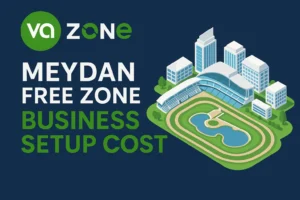
Meydan Free Zone Business Setup Cost (2025)—Affordable & Fast Setup Guide
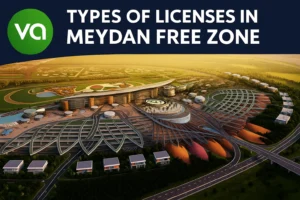
Explore 5 Powerful License Types in Meydan Free Zone—Find the Best Fit for Your Business
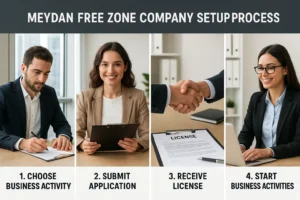
Meydan Free Zone Company Setup Process (2025)—Step-by-Step Guide
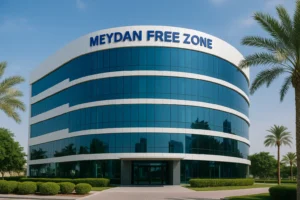
Meydan Free Zone vs Other Free Zones in Dubai (2025) – Which One Is Best for You?
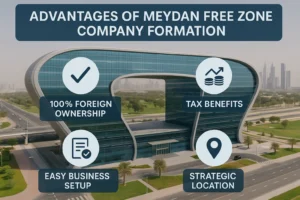
Top Benefits of Setting Up in Meydan Free Zone (2025)—Tax-Free & Strategic Location
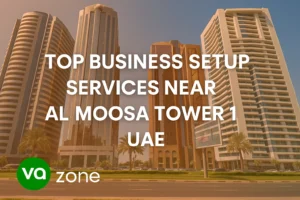

Best Business Consultant Near Al Moosa Tower 1 Dubai—Expert Setup with VA Zone
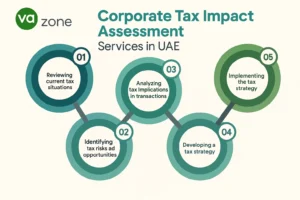



Corporate Tax Return Filing in UAE Made Easy | Step-by-Step Guide 2025








Fujairah Free Zone & Company Formation in Fujairah Creative City

Sharjah Media City Free Zone – Get Your Trading License & Business Setup in SHAMS

Sharjah Publishing City Free Zone (SPC Free Zone): The Ultimate Hub for Publishers & Entrepreneurs

Meydan Freezone Dubai: Business Setup Guide, Benefits & Costs (2025)


What Are the Benefits of Setting Up a Business in Dubai Mainland?

